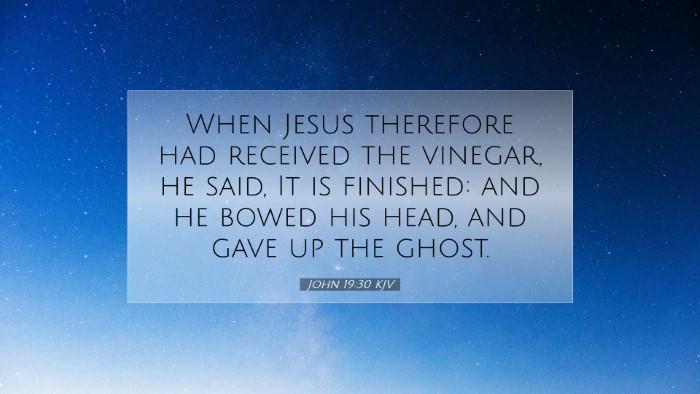Commentary on John 19:30
John 19:30 records the momentous declaration of Christ on the Cross: "It is finished." This phrase encapsulates the culmination of Jesus’ redemptive work and serves as a focal point for theological reflection. In this commentary, we draw insights from esteemed public domain scholars to explore the implications of this powerful statement.
Contextual Overview
This verse occurs at the climax of the crucifixion narrative, immediately before Jesus’ death. It is vital to comprehend the events leading to this moment, including the betrayal, suffering, and public ridicule Jesus endured. As Henry points out, the weight of sin borne by Christ heightened the significance of this proclamation.
The Significance of "It is Finished"
In the original Greek, "Tetelestai" conveys a sense of completion and fulfillment. Adam Clarke notes that this term was commonly used in ancient times to signify the completion of a task. Hence, when Jesus uttered these words, He affirmed that His mission of salvation was successfully accomplished.
1. Fulfillment of Prophecy
This declaration highlights the fulfillment of Old Testament prophecies regarding the suffering servant (Isaiah 53). As Barnes expounds, all the types and shadows of the Law found their ultimate realization in Christ's sacrificial death. The redemptive plan laid out from Genesis reached its zenith in this moment.
2. Completion of Redemption
Jesus' statement signifies the completion of redemption for humanity. Matthew Henry emphasizes that through His death, Christ paid the full price for sin, fulfilling the justice of God. This act established the foundation for reconciliation between God and humanity, resolving the estrangement caused by sin.
3. Victory over Sin and Death
In declaring "It is finished," Christ triumphed over sin and death. Clarke comments on the profound implications of this victory, illuminating the theme of substitutionary atonement—that Jesus was the Lamb of God who takes away the sins of the world. This victory is a cornerstone of Christian faith, assuring believers of their justification.
Theological Implications
The phrase echoes throughout Christian theology, inviting exploration of its implications for believers today.
1. Assurance of Salvation
For the believer, “It is finished” affirms that salvation is not earned by works but received as a gift of grace. As Barnes articulates, the assurance of faith hinges on the completed work of Christ. Believers can rest in the certainty that their sins are forgiven, and they are positioned in Christ.
2. The End of the Old Covenant
This moment signifies the transition from the Old Covenant to the New Covenant. The sacrifices of the old system became obsolete with Christ’s ultimate sacrifice, as Henry illustrates. Believers are hence called to approach God not through the Law but through the grace made available by Christ’s finished work.
3. Call to Follow Christ's Example
In light of His completion of the work required for salvation, believers are called to live in a manner worthy of their calling. Clarke incisively notes that understanding the depth of Christ's sacrifice should motivate believers to live out their faith with gratitude and obedience.
Practical Applications
In considering the implications of John 19:30, several practical applications emerge for pastors, students, and scholars alike:
- Renewal of Faith: Reflecting on “It is finished” invites believers to renew their faith in the sufficiency of Christ's atonement, relinquishing any notion of self-reliance.
- Sharing the Gospel: The proclamation of Christ’s sacrifice should propel evangelism, as it reveals the heart of the Gospel message. The dying world needs to hear that the price has been paid.
- Living in Freedom: Understanding this completion allows believers to experience true freedom from guilt and shame, as they live out their identity in Christ.
- Worship and Gratitude: “It is finished” leads to an overwhelming response of worship. Recognizing the completeness of Christ's work encourages a lifestyle of gratitude and praise.
Conclusion
John 19:30 profoundly encapsulates the essence of the Gospel, declaring the completion of Christ's redemptive work. As noted by the scholars, this declaration carries immense theological weight and practical significance for believers. It challenges us to embrace our faith fully, recognizing that our salvation and everyday living are rooted in what Jesus accomplished on the Cross. May this truth continue to transform lives and empower believers to share the hope found in Christ.


